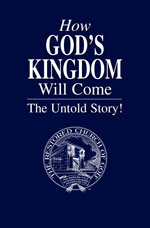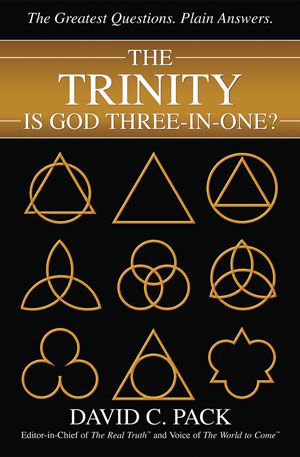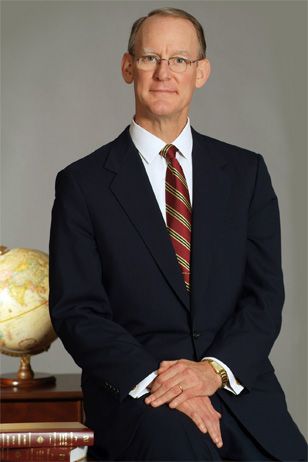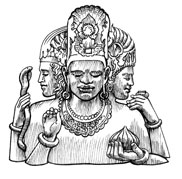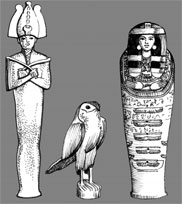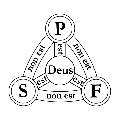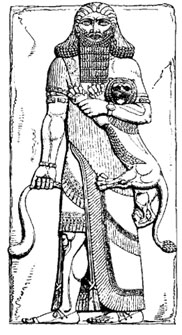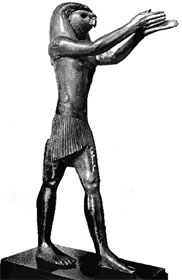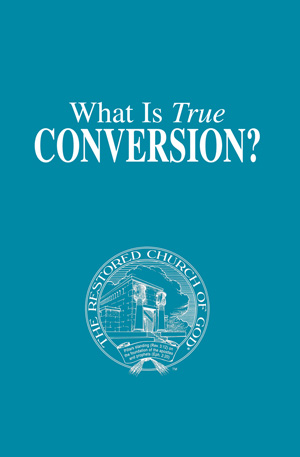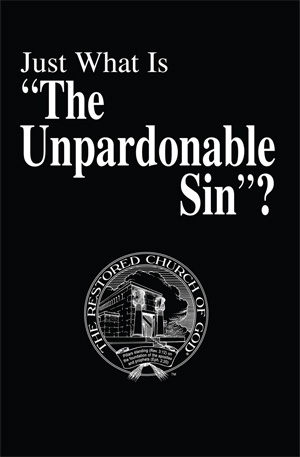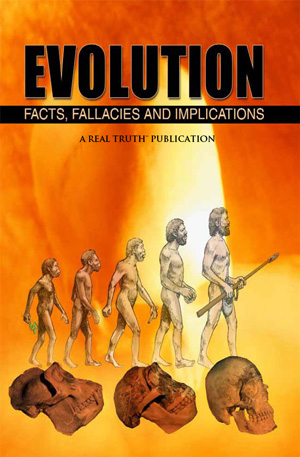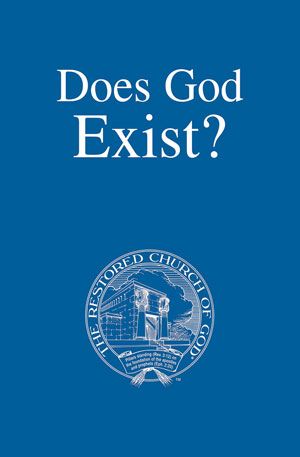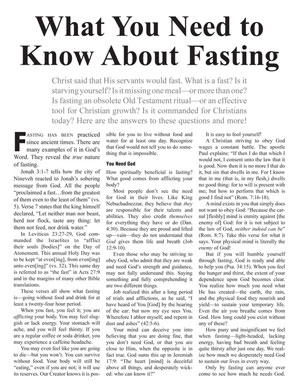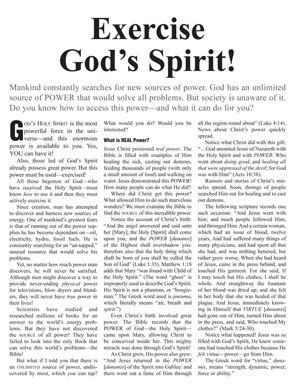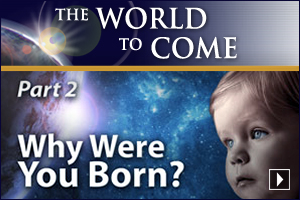It has been said that those who do not learn from history are condemned to repeat it. To truly unlearn all that the trinity entails, one must examine how it developedâits history. This chapter covers the origin of the teaching spanning thousands of years, even before the time of Christ.
You will see that theologians rely on human reasoning because they completely dismiss crucial facts of history! The book is loaded with these facts, bringing quote after quote from respected, reliable historians.
Detail is presented so the reader will not miss the big pictureâone that you will see to be fascinating. Many of these introductory quotes bring important background about what was happening in the New Testament Church. They are essential to understand first, before examining the period when the trinity gained acceptance. When put together, these facts are compelling.
It is vital to carefully examine these many sources for the message they contain. The trinity will be seen to have roots almost entirely in philosophy and abstract metaphysics. Remember from Chapter One that elements of this book will be difficult or impossible to understandâand that this is good. You will find yourself wondering how anyone could possibly believe that the trinity is scriptural!
Long before the Christian era, numerous variations of the three-fold god existed, and they were found in a host of pagan religions and mythologies. As with so many other pagan customs and practices that found their way into Christianity, the revival of this doctrine after Christ ascended to heaven was predictable. It was essential that followers be able to see Christianity in familiar terms. Offering pagans a three-in-one god became all-important to add believersâand gain power.
Triad deities (or three-in-one) first appeared in ancient Egypt soon after the Great Flood of Noahâs timeâaround 2300 BC. These deities came to be worshipped as Osiris, Isis and Horus.
Some facts of early history: After the destruction of the Tower of Babel, Nimrod and his wife-mother Semiramis, the first rulers of Babylon, fled to Egypt. Nimrod (known as Ninus or Athothis, among many other names) shared rulership with his father Cush (or Menes) in Egyptâs first dynasty. After Nimrodâs death, Semiramis claimed their son Horus was Nimrod reincarnated. These threeâOsiris (Nimrod), Isis (Semiramis) and Horus (their son)âcame to be exalted (Exploring Ancient HistoryâThe First 2500 Years, Schulz, ch. 11, 24).
In Babylon, these same three were known as Ninus, Ishtar and Tammuz. Over time, this triad became well-known in many nations. In ancient Rome, a triad of deities was worshippedâJupiter, Juno and Minervaâand they bore similarities to the above-mentioned triads.
Virtually all ancient religions possessed triad deities. Notice this astonishing acknowledgment (emphasis ours throughout): âThough it is usual to speak of the Semitic tribes as monotheistic; yet it is an undoubted fact that more or less all over the world the deities are in triads. This rule applies to eastern and western hemispheres, to north and south. Further, it is observed that, in some mystical way, the triad of three persons is oneâŚapplied to the trinities of all heathen religionsâ (Egyptian Belief and Modern Thought, James Bonwick, p. 396).
An example of this is found in the ancient roots of Hinduism. After the 6th century BC, Hinduism featured the three-in-one god that became known as the Trimurti. The god Brahman consisted of (1) Brahma, the creator, (2) Vishnu, the preserver and (3) Shiva, the destroyer (What the Great Religions Believe, Joseph Gaer, p. 25).
Orthodox Christianity vs. Apostolic Christianity
But how did the trinity develop within mainstream Christianity? Why were so many followers receptive to the very same schools of philosophy that had been rejected by the faithful first-century Christians?
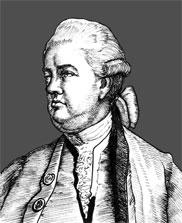
Historian Edward Gibbon
After the original apostles died, contradictions in teachingsâmeaning false doctrineâbegan to appear en masse, and Church history became lost. Famous historian Edward Gibbon, in The Decline and Fall of the Roman Empire, candidly acknowledged, ââŚThe scanty and suspicious materials of ecclesiastical history seldom enable us to dispel the dark cloud that hangs over the first age of the church.â
For nearly a century after events in the book of Actsâabout AD 70 to 170âwe find Church history to be virtually blank. In The Story of the Christian Church, Jesse Lyman Hurlbut calls this time the âAge of Shadows.â He writes, ââŚOf all the periods in the [churchâs] history, it is the one about which we know the leastâŚFor fifty years after St. Paulâs life a curtain hangs over the church, through which we strive vainly to look; and when at last it rises, about 120 AD with the writings of the earliest church fathers, we find a church in many aspects very different from that in the days of St. Peter and St. Paul.â
The New Testament offers many verses proving an apostasy was occurring, pulling believers from the truth. Notice the many warnings about false apostles and a false movement that already existed in the first century and was threatening the Church:
II Thessalonians 2:7: âFor the mystery of iniquity does already workâŚâ
II Corinthians 11:13-15: âFor such are false apostles, deceitful workers, transforming themselves into the apostles of Christ. And no marvel; for Satan himself is transformed into an angel of light. Therefore it is no great thing if his ministers also be transformed as the ministers of righteousness; whose end shall be according to their works.â
I John 4:1: âBeloved, believe not every spirit, but try the spirits whether they are of God: because many false prophets are gone out into the world.â
Jude 3: âBeloved, when I gave all diligence to write unto you of the common salvation, it was needful for me to write unto you, and exhort you that you should earnestly contend for the faith which was once delivered unto the saints.â
At the end of his life, the apostle John returned from exile and confronted this growing apostasy (falling away from truth) in the AD 90s. False leaders had gained control over congregations of the true Church in Asia Minor. Here is one account of the controversy:
âI wrote unto the church: but Diotrephes, who loves to have the preeminence among them, received us not. Wherefore, if I come, I will remember his deeds which he did, prating against us with malicious words: and not content therewith, neither does he himself receive the brethren, and forbids them that would, and casts them out of the churchâ (III John 9-10).
Such occurrences must have been repeated many times in many congregations late in Johnâs life. And they continued during the ministry of Polycarp, Johnâs successor.
Many Sources
Secular history also shows how false leaders changed the direction of the Church and cast out the few brethren who remained loyal to the apostlesâ teachings. About AD 135, the Jerusalem-Pella congregation came under control of an Italian named Marcus. He persuaded the majority to renounce the Ten Commandments, and only those brethren who did this were permitted admittance into Jerusalem by the Roman authorities.
But a faithful few refused to follow Marcus. Notice: âThe crimes of heresy and schism were imputed to the obscure remnant of the Nazarenes which refused to accompany their Latin bishopâŚIn a few years after the return of the church of Jerusalem, it became a matter of doubt and controversy whether a man who sincerely acknowledged Jesus as the Messiah, but who still continued to observe the law of Moses, could possibly hope for salvationâŚ[the followers of Marcus] excluded their Judaizing brethren [as Godâs people were also labeled] from the hope of salvationâŚ[and from] the common offices of friendship, hospitality, and social lifeâ (The Decline and Fall, Gibbon, ch. 15, p. 149).
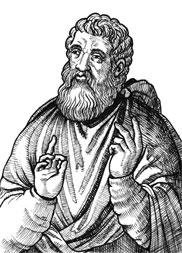
Justin Martyr
The remnant of the apostolic Churchâthose determined to adhere to the teachings of Jesus Christ and the apostlesâwere accused of âJudaizing.â This derogatory term implied that such a person sought to earn salvation by obeying Godâs commandments, including the Sabbath and His annual Holy Days.
Prominent theologians, such as Justin Martyr (AD 100-167), could not reconcile Christâs words in Matthew 19:17âââŚif you will enter into life, keep the commandmentsââwith the widespread belief that no works of any kind were required for salvation. Justin Martyr from the beginning embraced another gospel (Gal. 1:6-7), and condemned as heretical everything observed by the Jews.
The church that emerged in the early second century was dramatically different from the first-century Church. This transformation was described by Church historian Mosheim: âChristian churches had scarcely been gathered and organized, when here and there, men rose up, who not being contented with the simplicity and purity of that religion which the apostles taught, attempted innovations, and fashioned religion according to their own likingâ (Ecclesiastical History, Vol. 1).
But the apostasy, part of an orchestrated movement, was called âorthodoxââwhile the small, remnant apostolic true Church was suppressed, persecuted and forced into hiding.
Robert Robinson, author of The History of Baptism, wrote, âToward the latter end of the second century, most of the churches assumed a new form, the first simplicity disappeared; and insensibly, as the old disciples retired to their graves, their children, along with new converts, both Jews and Gentiles, came forward and new-modeled the causeâ (Eccl. Research, ch. 6, p. 51, 1792).
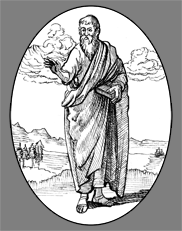
Polycarp
During the second century, Polycarp also confronted this apostate movement: âThe steady progress of the heretical movement in spite of all opposition was a cause of deep sorrow to Polycarp, so that in the last years of his life the words were constantly on his lips, âOh good God, to what times hast thou spared me, that I must suffer such things!ââ (Encyclopaedia Britannica, 11th ed., vol. 22, p. 22).
For instance, Polycarp and his successor Polycrates witnessed the wholesale departure of organized Christianity from observing Passover on the 14th day of the first month of Godâs sacred calendar, to the observance of Easter, an utterly pagan holiday. The few who held to the original teachings were called Quartodecimani. This faithful minority in Asia Minor, along with the Nazarenes of Syria, were the last holdouts of true Christianity in the eastern Mediterranean area of the Roman Empire (ibid., vol. 8, pp. 828-829).
Edward Gibbon sheds more light on this apostasy and its opposition to the original apostolic teachings. All of the apostates were steeped in the accepted philosophies of that timeâGnosticism in particular: âThe Mosaic account of the creation and fall of man was treated with profane derision by the GnosticsâŚThe God of Israel was impiously represented by the Gnostics as being liable to passion and to errorâŚâ
Gibbon explains the Gnosticsâ techniques: âAcknowledging that the literal sense is repugnant to every principle of faith as well as reason, they deem themselves secure and invulnerable behind the ample veil of allegory, which they carefully spread over every tender part of the Mosaic dispensation.â
He continued, âThe Gnostics were distinguished as the most polite, the most learned, and the most wealthy of the Christian name, and that general appellation which expressed a superiority of knowledgeâŚassumed by their own prideâŚThe Gnostics blended with the faith of Christ many sublime but obscure tenets, which they derived from oriental philosophyâŚâ (Decline and Fall, ch. 15, pp. 150-151). We will examine Gnosticism in greater detail later in this chapter.
But Christ has built His Church and promised it could not be destroyed (Matt. 16:18). While the visible church steadily gained preeminence, and as persecution increased on the true Church, its remnants went underground to survive. As a result, the new âChristianityâ of the second, third and fourth centuries had almost nothing in common with the practices and beliefs of the first century Christians. My book Where Is the True Church?âand Its Incredible History! tells this amazing story.
Converts of this âreligion in transitionâ dismissed biblical authority, replacing it with what came to be viewed as âOrthodoxâ teachings. They considered Greek philosophy and Gnosticism to be more attractive and familiar.
âChristianityââor the Bible?
Now letâs look at a short overview of how philosophers and theologians disregarded biblical teaching and authority. Note that the term âChristianityâ used below refers to established orthodoxy as recognized in the Roman Empire, as opposed to the teachings of Christ and His apostles:
(1) Orthodox Christianity came to accept that the Father was the Creator, rather than having created through Jesus Christ. Johnâs gospel plainly states that Christ (whom he calls âthe Wordâ) created all things (John 1:1-14; Col. 1:13-17).
(2) It came to accept that the Father was the God or Lord of the Old Testament. But the Bible shows that this personage was actually Christ (I Cor. 10:1-4).
(3) Orthodox Christianity believed that many people had spoken with the Father (in the Old Testament). Yet Jesus declared that no man had seen or heard the Father (John 5:37). And, because the Father was unknown to the world, one purpose of Christâs coming was to reveal Him (John 1:18, Luke 10:22).
(4) It came to believe that the Father and Son are âoneâ by some mystical way. However, the Bible says the Father and Son are âoneâ in the same sense that all members of the Church are âoneâ in unity and purpose (John 17:11).
(5) Orthodox Christianity accepted the premise of Judaism concerning monotheismâthat God was one being. Yet two distinct Beings are identified in the beginning of Johnâs gospel (1:1-2). Likewise, Genesis 1:26 records a conversation between these two God Beings. Notice: âAnd God said, Let Us make man in Our imageâŚâ The word âGodâ derives from the Hebrew Elohim (a plural termâactually a collective nounâsimilar to kingdom, family or church). Although there is one God, Kingdom or Family, Scripture reveals that it currently consists of two Beings.
On a related point that confuses many, the Jewish doctrine of monotheism comes from a misunderstanding of Deuteronomy 6:4, which says, âHear, O Israel: the Lord our God is one Lord.â This passage is correctly translated âHear, O Israel: the Lord our God is Lord alone (or only).â This verse is not talking about God as one Beingâit is not addressing the nature of Godâbut rather was instruction to Israel to not listen to other gods, but to listen to the true God aloneâonly! The context of Deuteronomy 6:4 is immediately after the Ten Commandments were listed by Moses to establish the requirements and authority of the true God.
Rather than the God Family being a closed trinity, as accepted by Christianity, this Family will expand through the many begotten sons of God yet to be born into it (John 1:11-12; Rom. 8:14, 19; I John 3:1-2). A later chapter will cover in greater detail the awesome potential of human beings.
Although Orthodox Christianity contradicts the Bible, the Bible does not contradict itself.
Philosophyâthe Pillar of Orthodox Christianity
The story of how the trinity became accepted is revealing. The Nicene Council of AD 325 was the pivotal event that marked its acceptance. Two opposing theologies, or factions, took part in this historic controversy.
Rather than seeing the Bible as direct instruction from God, the Orthodox movement used Godâs Word to allegorically explain pre-conceived philosophies. Notice the first of several difficult to understand quotes, but ones that are so telling: âThe Old Testament, allegorically explained, became the substitute for the outgrown mythology; intellectual activity revived; the new facts gained predominant influence in philosophy...â (Encyclopaedia Britannica, 11th ed., vol. 6, p. 284).
The result was that the Bibleâs literal meaning was thrown outâreduced to a mere starting point for allegorical interpretation: âAs in philosophy, so now in theology, the easiest solution of the problem was the denial of one of its factors: and successively these efforts were made, until a solution was found in the doctrine of the Trinity, which satisfied both terms of the equation [philosophy veiled thinly in theology] and became the fundamental creed of the Churchâ (ibid.).
The new movement hailed the trinity as a solution to various contradictions in their understanding. It seemed to satisfy the requirement of monotheism while acknowledging that Christ was God in the flesh. Notice: âIts moulds of thought are those of Greek philosophy, and into these were run the Jewish teachings. We have thus a peculiar combinationâthe religious doctrines of the Bible, as culminating in the person of Jesus, run through the forms of an alien philosophyâ (ibid.).
The next quote offers more early insight into the origin of the trinity. The doctrine is ânot primarily ethical nor even religious, but it is metaphysical. What is the ontological relationship between these three factors [Father, Son and Spirit]? The answer is given in the Nicene formula, which is characteristically Greek [meaning Greek philosophy]â (Encyclopaedia Britannica, 11th ed., vol. 6, p. 284).
This quote acknowledges that the trinity was ânot primarily ethical nor even religious.â At best, it categorizes the triune god as a metaphysical afterthought!
Now consider a similarâand unusualâadmission by Catholic scholars: âWe must be willing to admit that, should the doctrine of the Trinity have to be dropped as false, the major part of religious literature could well remain virtually unchangedâŚthe Christianâs idea of the incarnation would not have to change at all if there were no Trinityâ (The Trinity, Rahner et al., pp.10-11). Letâs summarize. Catholics could throw out their god and it would not affect their belief system! Stunning!
One must question how the trinity could ever grow to such a position of importance.
The TrinityâConceived in Philosophy
Before examining the dominant philosophy of the second to fourth centuries AD, we focus on the famous Greek philosopher Plato (427-347 BC) and his attempts to define God. Most Greek philosophy was based on his theories, later developing into Middle Platonism and eventually Neo-Platonism. All other philosophical schools of Greek origin, such as the Pythagoreans, were greatly influenced by Platonism.
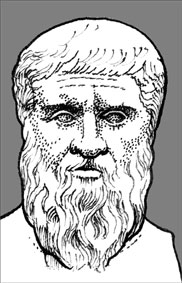
Plato
Plato is considered the greatest of all philosophers. He produced many famous works, including The Republic, in which his ideas were presented in the form of dramatic dialogues. His central dogma asserted that the âidealâ forms an absolute and eternal reality, and that this physical world is but an imperfect and transitory reflection. (If this is difficult to understand, remember, Plato was a philosopher, and the âuneducatedâ are not supposed to understand âgreat thinkers.â)
Since the concept of triad deities permeated all ancient religions, Plato was deeply ingrained in trinitarian thought. He wanted to better define God above the many deities in Greek mythology. (Recall what Paul found in Athens.) Platoâs definition consisted of: (1) The âfirst God,â who was the Supreme Being in the universe; (2) the âsecond God,â whom Plato described as the âsoul of the universeâ; and (3) the âthird God,â defined as the âspiritâ (Gods and the One God, Grant, ch. 12).
Ignoring the Bible, men came to regard Platoâs view as mankindâs best effort to define God.
Philo
Another theologian, Philoâof Alexandria, Egyptâbrought great influence on developing trinitarian thought. He lived about 15 BC to AD 50. From the second to the fourth centuries, this Jewish philosopherâs influence was profound.
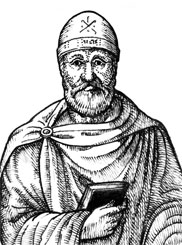
Philo
Himself greatly influenced by Plato, Philoâs version of the trinity was unique. This lifelong follower of Greek philosophy saw God as: (1) Father, who created all things (Philo called Him âthe Demiurgeâ), (2) Mother, who was Knowledge the Maker possessed and (3) the Beloved Son was the world. The union of Demiurge and Knowledge supposedly produced manâs world.
Such is philosophyâbut it is this kind of esoteric thinking that drove the birth and development of the trinity!
Different from Platoâs version, Philoâs trinity blended Platonism and Stoicism, and set the course of âChristianâ philosophy: âIn Greek philosophyâŚPhiloâŚchiefly follows the Platonic doctrines of Ideas and the Soul of the World, and the Stoic doctrine of God as theâŚReason operative in the world. In its Stoic form the latter doctrine was pantheistic [meaning many gods], but Philo could adapt it to his purpose simply by drawing a sharper distinction between the Logos and the worldâ (Encyclopaedia Britannica, 11th ed., vol. 21, p. 411). Hopefully, the reader is confused!
Here is how Greek philosophy influenced Philo: âPhilo certainly, to judge by his historical influence, was the greatest of all these Jewish philosophers, and in his case we can follow in detail the methods by which Greek culture was harmonized with Jewish faithâŚPhiloâs closest affinities are with Plato, the later Pythagoreans and the Stoicsâ (ibid.).
Also note that âin whole the substance of his philosophy the Jewish point of view is more or less completely modifiedâsometimes almost extinguishedâby what he has learned from the GreeksâŚtheir influence on Philo is nowhere more strongly seen than in the detailed development of his doctrine of Godâ (ibid., p. 409-410).
Philoâs common bond to Greek philosophy made him a significant influence in Christian thought, and thus in the development of the trinity.
Gnosticism
All those who contributed to the trinity doctrine were well-versed in traditional philosophy.
Here is where Gnosticism took its final form: âGnosticism [Greek for knowledge], the name generally applied to that spiritual movement existing side by side with genuine Christianity, as it gradually crystallized into the old Catholic Church...â (Encyclopaedia Britannica, 11th ed., Vol. 12, p. 152).
Note that Gnosticism was acknowledged to be distinct from true Christianity. Also, regarding the apocryphal writings, which were rejected as spurious by those who faithfully continued in the apostlesâ teaching, the previous source states, âGenerally also much Gnostic matter is contained in the apocryphal histories of the Apostles.â
Irenaeus, once a student of Polycarp, was swayed under the Gnostic influence of Justin Martyr. Irenaeus fell away from the apostolic Church in favor of the counterfeit movement centered in Rome.
Gnosticism also weighed heavily in the writings of Clement of Alexandria, as well as Origenâthe most prolific writer of the Christian era. To better understand the appeal of Gnosticism in the Catholic movement, consider the following facts:
âIt is a mistake to regard the Gnostics as pre-eminently the representatives of intellect among Christians, and Gnosticism as an intellectual tendency chiefly concerned with philosophical speculation, the reconciliation of religion with philosophy and theology. It is true that when Gnosticism was at its height it numbered amongst its followers both theologians and men of science, but that is not its main characteristic. Among the majority of the followers of the movement âGnosisâ was understood not as meaning âknowledgeâ or âunderstanding,â in our sense of the word, but ârevelationââŚGnostic sects and groups all lived in the conviction that they possessed a secret and mysterious knowledge, in no way accessible to those outside, which was not to be proved or propagated, but believed in by the initiated, and anxiously guarded as a secretâ (ibid.).
Both Gnosticism and Plato were deeply immersed in mysticism. Notice thisâand ask what it means: âThroughout this mystic religious world it was above all the influence of the late Greek religion, derived from Plato, that also continued to operate; it is filled with the echo of the song, the first note of which was sounded by the Platonists, about the heavenly home of the soul and the homeward journey of the wise to the higher world of lightâ (ibid., p. 155).
Platoâs influence in almost every aspect of the movement that replaced first-century Christianity was profoundâincluding mystery religions, the âsoul,â and the trinity. Gnosticismâs influence in the established Christian movement, especially in the second and third centuries, cannot be understated.
Again, however, the Bible teaches its students to âprove all things; hold fast that which is goodâ (I Thes. 5:21). In the scriptures, mysteries are unknown areas that are always eventually revealed to the reader who is willing to carefully put together all the scriptures on the matter:
- âUnto you it is given to know the mystery of the Kingdom of GodâŚâ (Mark 4:11)
- âBehold I show you a mystery; we shall not all sleep, but we shall be changedâ (I Cor. 15:51)
- âHaving made known unto us the mysteryâŚâ (Eph. 1:9).
- âEven the mystery which has been hid from ages and from generations, but now is made manifest [obvious]âŚâ (Col. 1:26).
These verses stand in stark contrast to the positions that the Gnostics held. The established Christian movement, especially in the second century, greatly elevated various cryptic metaphysical mysteries: âIn Gnosticism as in other mystic religions we find the same contrast of the initiated and the uninitiated, the same loose organization, the same kind of petty sectarianism and mystery mongeringâ (Encyclopaedia Britannica, 11th ed., Vol. 12, p. 153).
Another aspect of Gnosticism shows the strange assortment of mysteries that its followers advocated: âThe Gnostic must above all things learn the names of the demons, and equip himself with the sacred formulas and symbols, in order to be certain of a good destiny after deathâŚIt was taught that even the redeemer-god, when he once descended on to this earth, to rise from it again, availed himself of these names and formulas on his descent and ascent through the world of demonsâ (ibid.).
Such mysteries, central to the doctrines of Gnosticismâseen to be so obviously evil and dangerousâmolded the so-called âgreat mindsâ who contributed to the development of the trinity. Even the name âDemiurge,â which Philo attributed to the âFather who created all things,â was a term commonly used in Gnosticism, as well as in other schools of Greek philosophy.
Origen and Other Contributors
During the second century, the trinity was subject to much speculation. For example, Justin Martyr, known for his anti-Semitism and opposition to all things Hebrew, defined the trinity as âthe Father, Jesus Christ and the Holy Spiritâ (Apology 61.3). His thinking was influenced by Middle Platonism, Gnosticism, and the writings of Philo and other prominent philosophers of that time, such as Numenius. Irenaeus, a student of the apostle Johnâs disciple Polycarp, but who left the true Church, defined the Godhead as consisting of âthe Father, the Word and the Wisdom.â The trinity slowly became the focus of theologians and philosophers such as Clement of Alexandria and Origen, who was greatly influenced by the Gnostics.
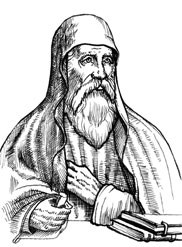
Origen
Origen (AD 185-254) has been called âthe most distinguished and most influential of all the theologians of the ancient church, with the possible exception of Augustine. He is the father of the churchâs science; he is the founder of a theology which was brought to perfection in the 4th and 5th centuries, and which still retained the stamp of his genius.â
Continuing, âHe could not have been what he was unless two generations before him had labored at the problem of finding an intellectual expression and a philosophic basis for Christianity (Justin, Tatian, Athenagoras, Pantaenus and Clement). But their attempts, in comparison with his, are like a schoolboyâs essays beside the finished work of a masterâ (Encyclopaedia Britannica 11th ed., vol. 20, p. 270). Such was the reputation of Origenâoften thought of as the author and father of the trinity.
Despite such praise, scholars recognized the difficulty of grasping Origenâs philosophical reasoning. Notice: âTo us, indeed, his conception of the universe, like that of Philo, seems a strange medley, and one may be at a loss to conceive how he could bring together such heterogeneous elements; but there is no reason to doubt that the harmony of all the essential parts of his system was obvious enough to himselfâ (ibid.).
What is this saying? Translated, âHis theories do not make sense to us, but surely they do to him.â
Origenâs thoughts were considered so profound that âOrthodox theology has never, in any of the confessions, ventured beyond the circle which the mind of Origen first measured outâ (ibid.).
This was true concerning his version of the trinity, which has largely remained intact as he fashioned itââFather, Son and Holy Spirit.â Of all who contributed to the idea of a trinityâfrom definition to extensive commentaryâOrigen is considered to have far exceeded all others.

Ancient Port of Alexandria
Like Philo, he grew up and spent most of his life in Alexandria, Egypt, under the influence of its âprogressiveâ atmosphere. Here is some background on the Alexandria that influenced Origen: âAlexandria had been, since the days of the Ptolemies, a centre for the interchange of ideas between East and Westâbetween Egypt, Syria, Greece and Italy; and, as it had furnished Judaism with an Hellenic philosophy, so it also brought about the alliance of Christianity with Greek philosophyâŚin Alexandria, Christian ideas were handled in a free and speculative fashion and worked out with the help of Greek philosophyâ (ibid.).
Concerning his writings, âOrigen is probably the most prolific author of the ancient church. âWhich of us,â asks Jerome, âcan read all that he has written?â The number of his works was estimated at 6000âŚâ (ibid., p. 271).
Origen was steeped in asceticism, the doctrine of extreme self-denial, austerity and human will worship. He slept on cold stone floors and went barefoot most of his life. To curb lust and demonstrate his stoic courage, he surgically made himself a eunuch while lecturing his students. Notice: âHis manner of life was ascetic; the sayings of the Sermon on the Mount and the practical maxims of the Stoics were his guiding starsâ (ibid., p. 270).
Heavily influenced by Plato, Philo and Origen, professing Christianity increasingly accepted Greek philosophy. In the tradition of the Gnostics, theologians and philosophers allegorized the scriptures to illustrate a higher order of wisdom. In the truest sense, philosophic reasoning became the center of the intellectual universe, with the Word of God orbiting around it. Traditional Christianity, propelled by Greek philosophy, freed itself from Godâs authority and set out to refashion God into the highest form that the thought-to-be âgreatestâ human minds could devise. This was most realized in the doctrine of the trinityâa mystery even to its authors, but considered the pinnacle of human creativity.
In the world of the triune deity, men created God instead of the other way around!
The Early Church Rejected Philosophy
Yet the first-century apostles rejected philosophy to interpret Scripture: âNone of the early Christian apologists [defenders of the faith] paid any attention to a doctrine like thisâ (Gods and the One God, Grant, ch. 12).
One source best describes how Paul viewed philosophical reasoning: âMetaphysics [a branch of philosophy focused on origins] and speculative theories were valueless for Paul; he was conscious of a mighty power transforming his own life and filling him with joy, and that this power was identical with Jesus of Nazareth he knew. In all this Paul is the representative of that which is highest and best in early Christianity. Speculation and hyperspiritualization were ever tending to obscure this religious factâŚâ (Encyclopaedia Britannica, 11th ed., vol. 6, p. 284).
In Colossians 2:8, Paul warns against philosophy, calling it a vain and worldly deceit: âBeware lest any man spoil you through philosophy and vain deceit, after the tradition of men, after the rudiments of the world, and not after Christ.â
Paul goes on to condemn asceticism: âWherefore if you be dead with Christ from the rudiments of the world, why, as though living in the world, are you subject to [human] ordinances, (touch not; taste not; handle not; which all are to perish with the using;) after the commandments and doctrines of men? Which things have indeed a show of wisdom in will worship, and humility, and neglecting of the body; not in any honor to the satisfying of the fleshâ (vs. 20-23).
In I Timothy 6:20-21, Paul is even more direct: âO Timothy, keep that which is committed to your trust, avoiding profane and vain babblings, and oppositions of science falsely so called which some professing have erred concerning the faith.â The Greek word for âscienceâ is Gnosis. Clearly, Paul condemns Gnosticism. And his example reflected the position of the first-century Church in condemning all philosophy in general.

The Gates of Nicaea
Romans 1 describes the ancient philosophersâ rejection of the true God and His authority, while at the same time engaging in vile sexual conduct (vs. 18-32). Inspired by God, Paul describes their philosophical conclusions as abominations as much as were their perverse and promiscuous lifestyles.
But the Christianity that had come to dominate by the third and fourth centuries exalted these philosophers. Their human reasoning and speculation were seen as pillars of understanding that would interpret Scripture.
The Council of Nicaea
In the early 300s, during the most severe persecution against all who claimed to be Christian, the Roman armies proclaimed Constantine, their favorite general, to be Caesar. Constantine defeated Maxentius in the Battle of Milvian Bridge outside Rome.
Before battle, Constantine claimed he had a vision of the first two letters of Christâs name (in Greek, chi [X] and rho [P]) on a banner, with a voice stating, âBy this sign you will conquer.â Taking these as symbolic of Godâs favor, Constantine felt indebted to Christianity for his victoryâdespite being a dedicated sun worshipper!
Upon becoming emperor, he immediately issued the Edict of Toleration, which made Christianity legal throughout the empire. This ended 10 years of severe persecution against the true Churchâbut it also paved the way for the Catholic brand of Christianity, centered in Rome, to rise to preeminence throughout the Empire (The History of the Church of God, Kelly, part 4).
Constantine recognized the political benefit of aligning with Christianity. Not only did he credit it for establishing him as Emperor, he understood its potential for unifying the empire.
Yet the Christianity of the Western Empire was very different from that in the East and of the other small sects in North Africa. So Constantine took measures to âstandardizeâ his new ally.
The Pivotal Council of Nicaea
The Council of Nicaea, the first ecumenical council of the Catholic Church, was conducted at Constantineâs imperial summer residence in Nicaea of Bithynia, from May 20 until July 25, AD 325. Most of the 318 delegates came from the eastern part of the empire, which was generally more conservative.
Numerous items were on the agenda. One was secular enforcement of laws adopted by the church, as promised by Constantine once unity was established. This would be achieved by healing the growing rift between advocates of the trinity and the Arian movement.
Another issue was a law forcing celibacy on the clergy. But the council rejected it in favor of defending the sanctity of marriage. There were elements in the empire that resisted the innovations that the clergy in Rome advocated. Later, of course, their influence steadily diminished.
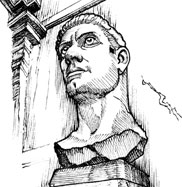
Constantine, from a bust in Rome
The Council of Nicaea officially âadmitted the principle that the state might employ the secular arm to bring...Christian subjects of the Roman world-empire under the newly codified faithâ (Encyclopaedia Britannica, 11th ed., vol. 19, p. 640). This meant that, as protector of the only recognized form of Christianity in the empire, Constantine held authority to force everyoneâpagans and all brands of Christianityâinto conformity or exile.
The greatest controversy at the Council of Nicaea involved the nature of God and how the trinity was decreed to be doctrine in the Roman Empire. This controversy flared throughout the debates and continued even after the final decision. Inroads, though shaky, were made for the approval of a compromised version of the trinity. (But it was not until AD 381, at the Council of Constantinople, that the Catholic Church finally adopted the Nicene Creed, which officially approved the trinity doctrine.)
Opposing Sides
There were two opposing sides at Nicaea. One was represented by Arius, the other by Athanasius. Both men came from the same congregation in Alexandria, Egypt. Arius was a priest, and 43 years older than Athanasius, who was a deacon. Both were influenced by the speculative mindset of Greek philosophy: âArius (250-336) had received his theological education in the school of the presbyter Lucian of Antioch [in Syria], a learned man, and distinguished especially as a biblical scholarâŚLucianâŚpersisted in holding that the Logos became a person in Christâ (ibid., vol. 2, p. 543).
Lucianâone of the most sound and capable teachers of that timeâhad compiled what became known as the Received Text, the authentic Greek manuscripts of the canonized New Testament Scriptures. His preservation of the Hebrew scriptures in Greek is also significant. Erasmus, the foremost Catholic scholar in history, strongly favored Lucianâs texts over Jeromeâs spurious Latin translation, known as the Vulgate.
During and after the Council of Nicaea, the Catholic position was that all who denied the trinity were effectively denying Christâs divinity. But Lucianâs teachings proved this false. He had strongly advocated (as does the Bible) Christâs divinity before He came in the flesh. Lucian rejected the philosophical trappings of the trinity. He was strictly scriptural in the tradition of the apostles, and was himself considered a âJudaizer.â
On the one side was Arius, who studied under Lucian, and compromised. He leaned toward the teachings of Paul of Samosata.
On the other hand, Athanasius (AD 295-373) followed the philosophy of Origen. As a Platonist and Stoic, Origen was the antithesis of Lucian.
The Council of Nicaea brought to a head the leading proponents of opposite extremes: Lucian and his strict, literal biblical interpretation vs. Origen and his speculative philosophy. This was potentially an opportunity for biblical reasoningâAriusâto face off with a renowned champion of human reasoningâAthanasiusâwho would represent the deceased Origen, who died about 40 years before Athanasius was born.
As is so often the case, true biblical teaching was not properly represented. Arius sold out his biblical training and brought his own unscriptural thinking, maintaining that Christ had to be a created Being and had not been God prior to becoming flesh. Defining Christ as a created Being, Arius deduced that a member of the true Godhead could never dwell among sinful mankind. This became the greatest weakness in his thinking and became the basis for the rejection of his views at Nicaea.
Both sides departed from the Bible, but in different ways. The movement that contributed to Catholic thought, represented by Origenâs vast writings, even more blatantly distorted Scripture. Through the centuries, proponents of this thinking have remained unswerving from their original foundationsâholding to tradition without deviation. (Remember Jeremiah 2:11-13.)
The opposing sides took weeks to present their views. Abstract terms to define the mysterious state of the trinity were a source of constant confusion. Consider just one example of the utter nonsense at work in the process that produced a manmade god: âA great trouble arose, since there are two terms in Greek of historical fame. The first, homos, meaning âidenticalâ and the second, homoios, meaning âsimilarâ or âlike untoââŚThe spelling of these words is much alike. The difference in meaning, when applied to the Godhead, is bewildering to simplehearted [sane] believers. Nevertheless, those who would think in terms of homoiousian, or âsimilar,â instead of homoousian, or âidenticalâ were promptly labeled as heretics and Arians by the clergy. Yet when the emperor, Constantine, in full assembly of the Council of Nicaea, asked Hosius, the presiding bishop, what the difference was between the two terms, Hosius replied that they were both alike. At this all but a few bishops broke out into laughter and teased the chairman with heresyâ (Truth Triumphant, Wilkinson, p. 92).
Athanasiusâ position centered on the belief that Christ was a God Being, having always existed before becoming human. True! But many considered his philosophical extrapolationsâfrom Origenâto be confusing theory and conjecture. Of course they were. Athanasiusâ greatest advantage was that Arius sought to defend what the majority believed indefensible.
Disagreement Continues
Debate flared throughout and continued even after a compromised trinity was selected. After opposing views had been presented, each side continued to lobby and position itself for weeks behind the scenes. Most delegates were unimpressed with either argument, both of which were considered extreme. Athanasius was opposed by many delegates from the East. The majority, still somewhat influenced by remnants of the true Church, was more conservative.
Finally, as the Nicaean Council ended, most voted for Athanasius, not because they agreed with him, but as the lesser of two evils. Most considered both sides unacceptable. The outcome is best described here: âIn the main they perpetuated the line of Origenâ (ibid., vol. 19, p. 641). The emperor demanded one position win, and he wanted to follow the majority decisionâeither way. He was also determined to enforce it. Sensing where the decision was going, participants made it almost unanimous (300 out of 318) because they feared death or exile if they were on the wrong side of the outcome, not because they thought it was right!
Eventual Acceptance
Think carefully. It is incredible that the decisionâany âdecisionââby men regarding the nature of the God of the Universe was born in such an environment, but it was. It is time for some questions: Does this seem acceptable? Do you think God would do it this way? Will you care?
The councilâs decision spelled trouble for Arius and his allies, who were banished for a time. Arians and semi-Arians were temporarily out of favor. Yet this would change in a few years. The considerable conflict that simmered between the disputing parties would be resolved decades later at the Council of Constantinople. It was then that the trinity would become a central teaching of the church at Rome.
The only time Arianism threatened to return was during the rule of Emperor Valens, who had attempted to revive itâbut without success. After Valensâ reign, Arianism, which had already been rejected by the Roman church, was officially rejected by the empire.
As a footnote in history, the Arian movement âlived to flourish anew among the Germanic tribes at the time of the great migrations [5th century and afterwards]. Goths, Vandals, Suebi, Burgundians and Langobardi embraced it; here to a distinctive national type of ChristianityâŚâ (ibid., Vol. 2, p. 544). While Arianism diminished from view during the middle ages, it was resurrected by Adolph Hitler to promote pride and nationalism in Nazi Germany at the time of World War II. Once again, this âdistinctive national type of Christianityâ was hailed by Germanic peoples. Under the Nazis, âArianismâ was transformed into âAryanismââa racial term proclaiming the superiority of Germanic peoples, rather than a doctrine or creed.
The Adopted Creed
The famous Nicene Creed was not strongly trinitarian when compared to later Catholic writings. It devoted little comment to defining the Father, and even less to defining the Spirit. The majority of the Creed explains the exact definition of Christ, refuting what Arius had advocated. But the Creed did lay the groundwork for a stronger definition to be made later. Most trinitarian language had to be removed from the councilâs decision to win the delegatesâ approval.
The Nicene Creed, principally drawn up in AD 325, was a revision of a creed written earlier that year by Eusebius of Caesarea, historian and close confidant of Constantine. Later revisions reflected additions made primarily at the Council of Constantinople.
The Nicene Creed reads:
I. We believe in one God, the Father Almighty, the maker of all things visible and invisible.
II. And in one Lord Jesus Christ, the Son of God, begotten of the Father, only begotten, that is of the substance of the Father, God of God, Light of Light, very God of very God, begotten not made, being of one substance with the Father, by whom all things were made, both those in heaven and those on earth. Who for us men and for our salvation came down and was incarnate, and was made man, And suffered, And rose the third day, Ascended into heaven, Is coming to judge quick and dead.
III. And in the Holy Ghost (Encyclopaedia Britannica, 11th ed., vol. 7, pp. 395-396).
Holy Spirit Moves Toward Personhood
Notice the very sparse wording of the third section: âAnd [we believe] in the Holy Ghost.â There was a reason for this. Many originally opposed longer draft versions of the Creed, which included more about Origenâs viewpoint concerning the Holy Spirit, because they could not go along with the strongly trinitarian views. After Nicaea, theologians who advocated the trinity became bolder and more explicit in enforcing their belief within the empireâand that it meant that the Holy Spirit was a third person. By AD 381, at the Council of Constantinople (56 years after Nicaea), the trinity was largely in place.
The philosophies of Origen prevailed. Remember, this man was an extremely unbalanced Stoic who publicly castrated himself! Astonishing, but true!
After Nicaea, both Arius and Athanasius were alternately in and out of favor with the church hierarchy and Roman leaders. This highly unpredictable atmosphere was polluted by political favoritism, betrayal and backstabbing. Shifts in leadership could mean honor or ruin, depending on the political landscape at the time. One could be elevated one year and banished the next. Even Origen had been subject to thisâvenerated for a time and fleeing for his life soon after.
(Numerous versions of the creed have been in circulation through the centuries. A popular and far stronger creed, fraudulently attributed to Athanasius, was found to have been drawn up in the fifth century. Its language was much more explicit than could have been approved at Nicaea in AD 325. It is generally recognized that Catholic theologians and historians modify history according to personal liking.)
It took many years for this doctrine to become deeply ingrained in Catholic thought. Eventually it took hold and has stayed firmly in place, so much so that none of the Protestant sects that separated during the 1500s ever questioned its validity. It had become blindly accepted, despite its completely unbiblical origins. The Protestant acceptance of this doctrine is succinctly expressed in this way: âIn regard to the Trinity, Protestantism has nothing very new to sayâŚâ (Encyclopaedia Britannica, 11th ed., vol. 26, p. 780).
The Long Road to Embracing a Triad Deity
Regarding the trinity, there is a distinct difference between the beliefs of the original first-century Church, led by the apostles, and the church that developed later, as influenced by Greek philosophy and other schools of thought. Although historical evidence of this transition was deliberately shaded, sufficient details remain to confirm what actually happened.
Shortly before his martyrdom in AD 68, Paul admonished, âBut continue you in the things which you have learned and have been assured of, knowing of whom you have learned themâ (II Tim. 3:14).
Paul was stressing to those of Christâs true Church the vital importance of continuing in what they had already learned, and to remember the source of all truthâChrist and the apostles. Paul knew that the apostlesâ teachings and principles were timeless. They did not need to be updated, modified or allegorized by self-proclaimed teachers, philosophers, scholars, poets and âprophets.â That body of true knowledgeâdistinct from Greek philosophy or any other sourceâwas to be retained and practiced.
The leading contributors to trinitarian thought were devoted to Platonism and other forms of human wisdom. They considered the Bible to be of secondary importance, interpreting Scripture as allegories revealing philosophical principles they saw as infinitely more profound than Godâs inspired Word. The philosophy of men appealed to the intellectual vanity of theologians who were Christian in name only. They created a system that emerged with growing momentum well before the time of Constantine.
When the Council of Nicaea convened, the Catholic movement had already purged most of the last vestiges of those labeled âJudaizersââthe faithful who upheld Scriptural authority. The way was now clear to implement long-coveted speculative ideas of Greek philosophy.
After Nicaea, emboldened theologians were free to upgrade and refine the trinity to its full definition, as taught by Origen. And they did this with little hesitation.
Origen had defined the theological boundaries of their playing field. Read and reread this stunning acknowledgement of Origenâs influence on the birth, development and entrenchment of the trinity: âOrthodox theology has never, in any of the confessions, ventured beyond the circle which the mind of Origen first measured outâ (Encyclopaedia Britannica, 11th ed., vol. 20, p. 270).
He and his predecessors truly defined the god that millionsâeven billions!âwould worship for the nearly 17 centuries to present.
The history of the trinity has been one of blood, murder and savageryâof intolerance and condemnationâand of total blind allegiance and conviction.
As Catholic influence spread in the Middle Ages across Europe and beyond, great numbers of people were forced to accept the trinity under pain of death. Like the spread of Islam by the edge of the sword, with infidels routinely slashed to death, this enforcement was by the point of the sword, where Christian infidels were usually pierced to death. This is its own statement about the triad âgodâ and its âfruitsâ (Matt. 7:16, 20). Then there are the thousands who died in ignorance fighting on behalf of a trinity they never understood.
But there is moreâmuch moreâto consider!

